McGurk's Bar bombing: 'I want justice for my grandparents'
- Published
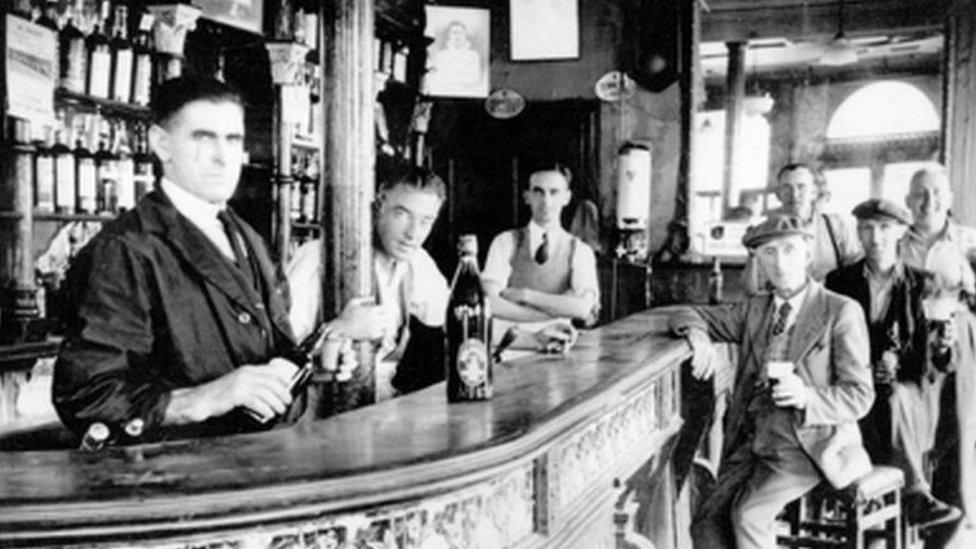
McGurk's Bar was a family-owned pub run by Patrick McGurk (third from left)
Just a few weeks before Christmas 1971, former soldier John Irvine took his wife Kitty for their usual Saturday night drink in their local pub.
The Army veteran had survived World War Two and was decorated for his service but what happened in that pub that night "broke him", says his grandson.
A bomb ripped through the building, bringing down the roof and trapping customers and staff under the rubble.
John was pulled out of the rubble alive but his beloved Kitty had already died beside him.
Kitty Irvine was one of 15 people killed in the McGurk's Bar bombing on 4 December 1971.
The death toll included two children aged 13 and 14 and several pensioners - the oldest victim was 73.
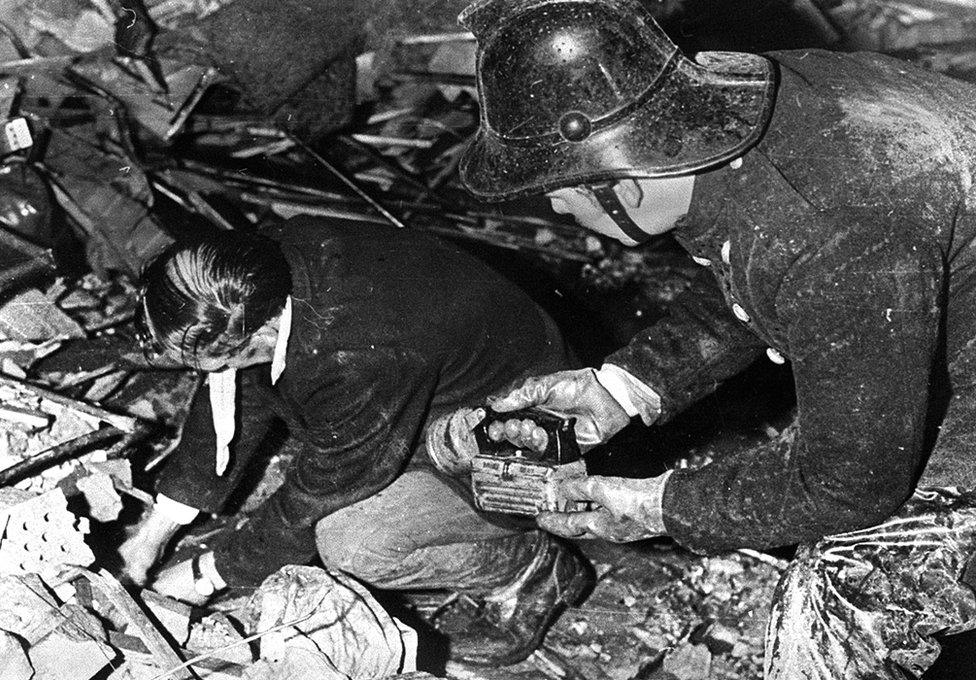
Firefighters and civilians were among those who searched through the rubble after McGurk's Bar was bombed
Half a century has now passed since a loyalist paramilitary gang bombed the pub but only one person involved in the attack has been brought to justice for the murders.
John and Kitty's grandson Ciarán MacAirt has dedicated much of his life to finding out the truth about the murders.
He never got to meet his grandmother because Kitty was killed three years before he was born but it was his heartbroken grandfather who inspired his campaign for justice.
"The man who loved her more than life - my grandfather - was my hero and that's part and parcel of the reason why I continue the fight until this day," Mr MacAirt told BBC News NI.
"My granda, it might surprise some people, was a colour sergeant in the Royal Irish Fusiliers who had fought throughout the whole of the Second World War.
"No matter what sights and sounds my granda saw during World War Two and how horrific that must have been - because he has medals for extensive service across continents in the British Army - it was McGurk's Bar that broke him and the loss of his wife that broke him."

Ciarán MacAirt has turned his archive research activities into a full-time job
Although there have already been several high-profile investigations into the attack, Mr MacAirt believes the full story is yet to be uncovered.
Misinformation
It is now well-known that the no-warning bomb was planted by the Ulster Volunteer Force (UVF) but in the immediate aftermath of the attack the police and security forces blamed republicans.
Government officials and the media were told it was likely to have been an IRA bomb that exploded prematurely while being built inside the pub.
That misinformation endured for years and compounded the families' trauma, implying some innocent victims were bomb makers, culpable for their own suffering.
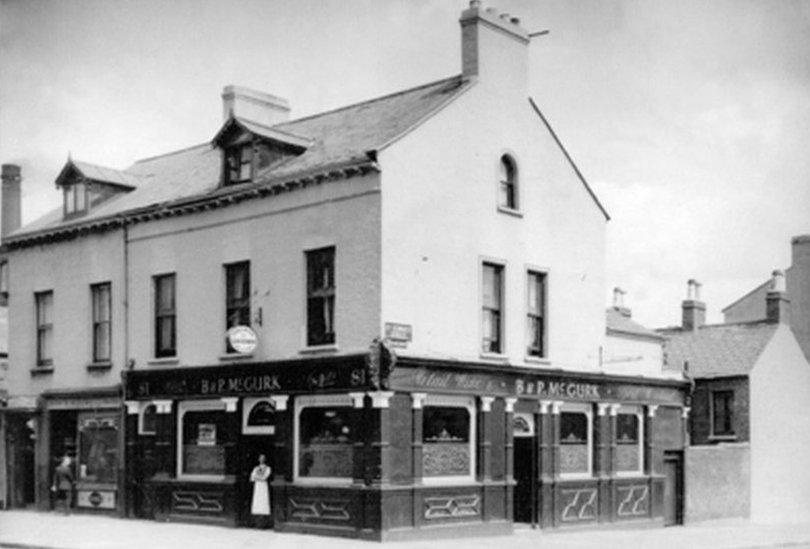
Patrick McGurk (centre) lost his wife, his 14-year-old daughter, his home and his business in the bomb
But in 1977, UVF member Robert James Campbell admitted being part of the loyalist gang who planted the bomb.
Campbell served 15 years in prison for murder but his accomplices, including those who made the bomb and lit its fuse, escaped detection.
'Raider of the lost archives'
Mr MacAirt has spent years researching public records and military documents, trying to pinpoint who disseminated false information in the aftermath of the bomb and why.
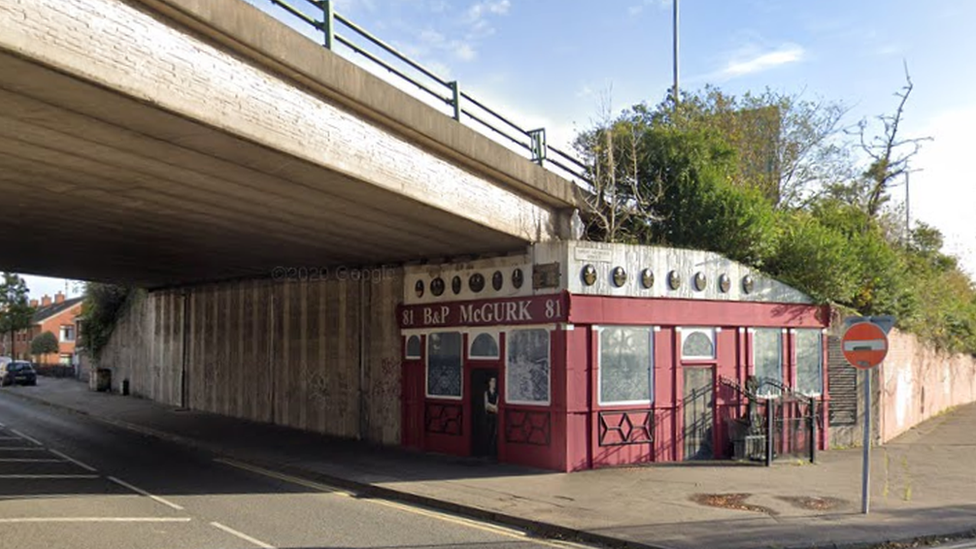
A memorial is now painted on the motorway flyover where McGurk's bar used to stand
He now describes himself as a "raider of the lost archives" and has set up his own research organisation to assist other Troubles victims to access information about their loved ones' deaths.
Critics of historical investigations point out the process is not even-handed, particularly for families whose loved ones were killed by paramilitaries, as those groups did not keep records of their actions.
However, the McGurk's families are victims of paramilitary killers too and Mr MacAirt feels British military archives continue to shed light on the case.
'Investigative bias'
As a result of the families' campaign, the bombing has been the subject of two police investigations, two Police Ombudsman reports and numerous court challenges but there has still only been one conviction.
The attack was also examined by the Historical Enquiries Team (HET) - a unit that reviewed Troubles murders.
In 2011, a revised Police Ombudsman report identified "investigative bias" and failures in the original Royal Ulster Constabulary (RUC) murder inquiry but found no evidence of RUC collusion with the killers.
The then chief constable of the Police Service of Northern Ireland (PSNI) Matt Baggott angered the families by disputing the finding of RUC bias.
Then in 2014, the HET's investigation also found no evidence of bias.
It should be remembered, as indeed the ombudsman's report pointed out, McGurk's Bar was bombed during the height of the Troubles when violent death was an almost daily occurrence.
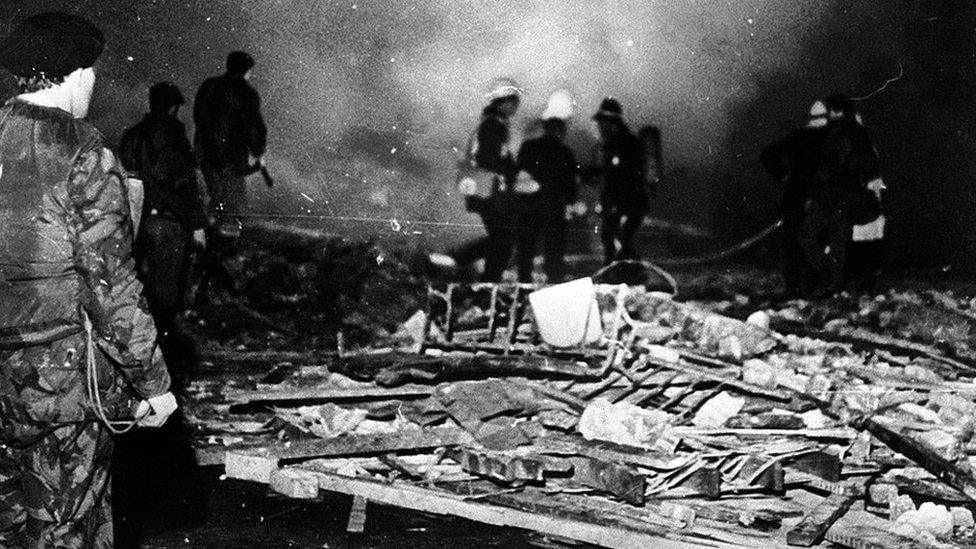
The McGurk's Bar attack had the highest death toll of any Belfast bombing during the Troubles
More than 650 people died in Trouble-related incidents between 1971 and 1972 and police investigating the deaths were themselves at great risk of attack.
Indeed, an Army major was shot during rioting which broke out in the nearby New Lodge area in the aftermath of the McGurk's bomb and died from his wounds days later.
One week later, on 11 December, a bomb exploded in the Balmoral Furniture Company showroom on the predominantly Protestant Shankill Road in west Belfast.
It is widely believed the IRA planted the bomb in retaliation for the McGurk's Bar attack.
It killed four civilians, including two babies - a service to mark 50 years since their deaths was held on Saturday.
Ongoing challenges
The McGurk's families have taken several legal actions on behalf of their loved ones and the process has taken its toll on them.
In 2015, the families contested the HET report in the High Court, attempting to get its findings quashed.
Much of the heat was taken out of that case when the court was told the PSNI was no longer disputing the finding of bias but as of now that HET report still stands.
The families also sought new inquests into their loved ones' deaths but that was refused by Attorney General John Larkin in 2018.
The families have not been deterred and legal challenges against the HET report and inquests refusal remain open, according to Mr MacAirt.
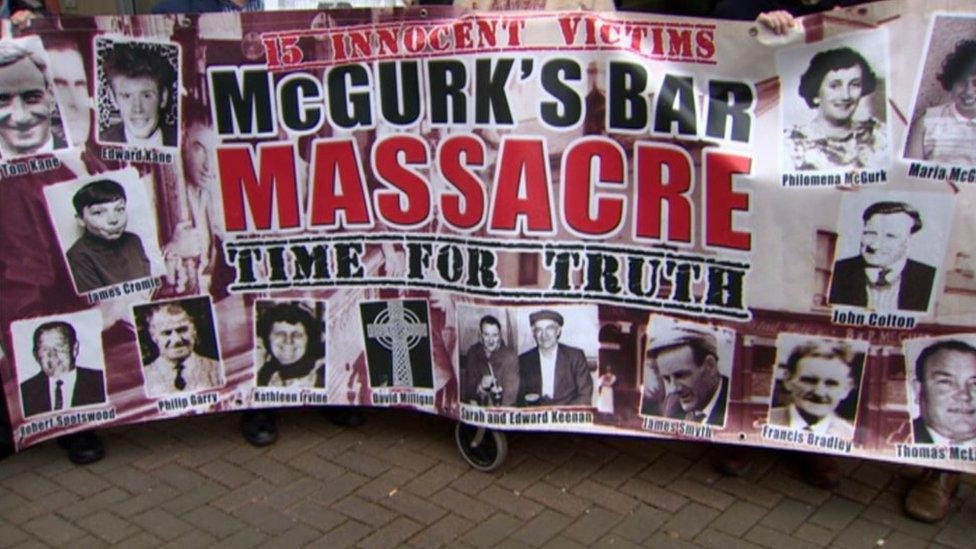
Families of those killed in the bomb have led a long campaign for answers
Following the ombudsman's criticisms of the original RUC murder inquiry, the PSNI began a review of the case with the involvement of the HET.
Two men aged 75 and 69 were arrested in 2014 in connection with the bombing but both were later released unconditionally.
BBC News NI asked the PSNI if the murder inquiry was currently active.
"I fully appreciate and acknowledge the suffering still being experienced by all of the families of those killed and injured in the McGurk's Bar atrocity," said Det Ch Supt Rowan Moore.
"Unfortunately there are currently no new lines of enquiry which would assist us in bringing to justice the accomplices of the UVF terrorist who was convicted in connection with the atrocity.
"If new evidence emerges, we will thoroughly examine it to establish if there are grounds for a further reinvestigation."
Ban on prosecutions
This year the government announced proposals to end all Troubles-era prosecutions, inquests and court cases.
The plan is supported by campaigners for military veterans but has angered Troubles victims from all backgrounds, who feel such a ban would destroy any hope of justice.
"No matter what the British government thinks that it can throw up as far as legislation is concerned, they've got big, big hills to climb," Mr MacAirt said.
"Because there's thousands of family members just like me who are driven by a very simple, basic human emotion and that's love for the people that they've lost."
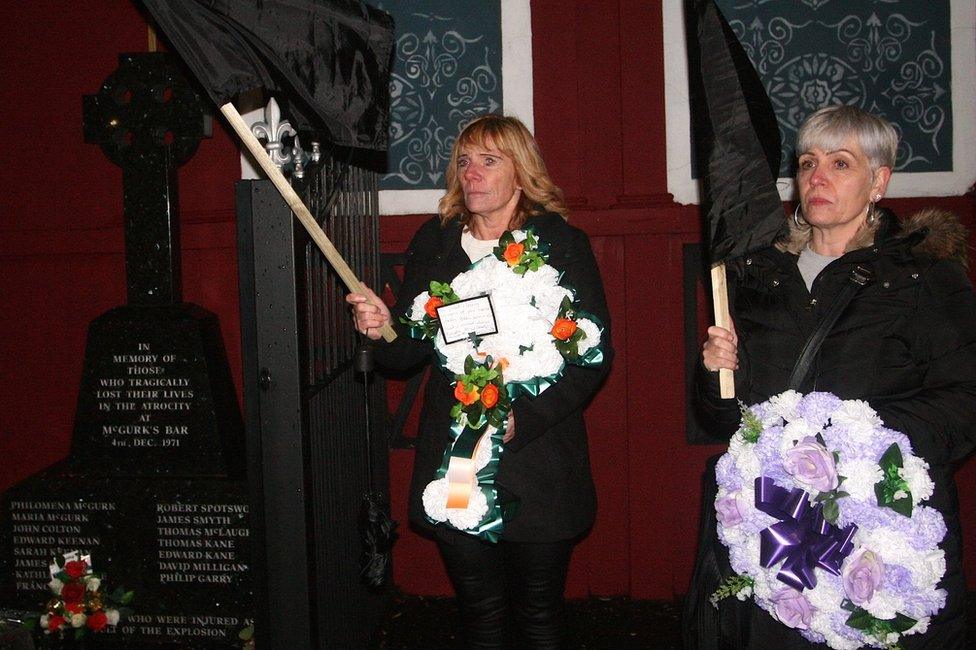
The 15 victims' names are carved in stone at the junction of North Queen St and Great George's St
Last weekend, the families marked the 50th anniversary of their loved ones' deaths at a memorial erected at the site where McGurk's pub once stood.
Mr MacAirt believes the authorities are still withholding information that could provide answers about the bombing and the misinformation that detrimentally influenced the RUC murder inquiry.
He continues to gather files relating to Army operations in the days before and after the bomb and plans to present them to the attorney general next year in a renewed bid for new inquests.
Related topics
- Published4 October 2018
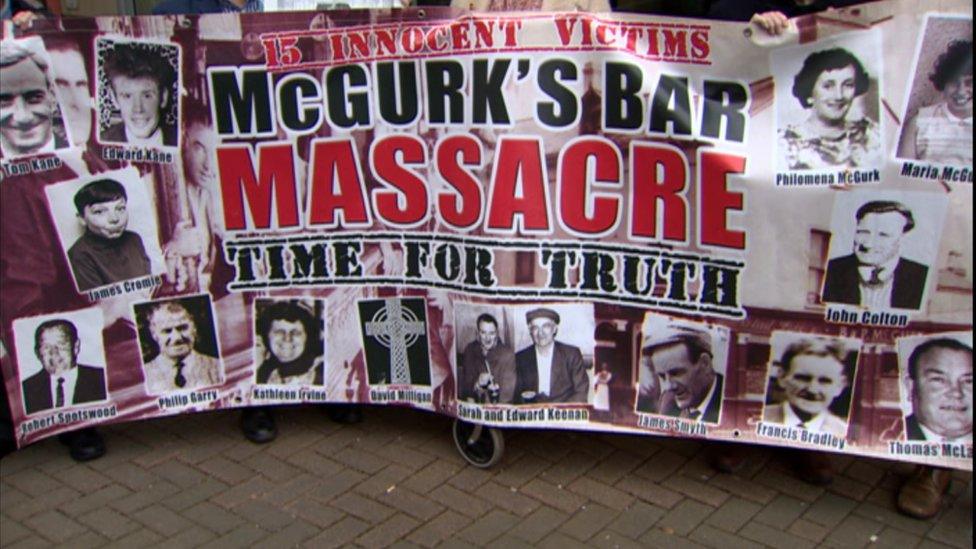
- Published5 July 2018

- Published14 July 2021
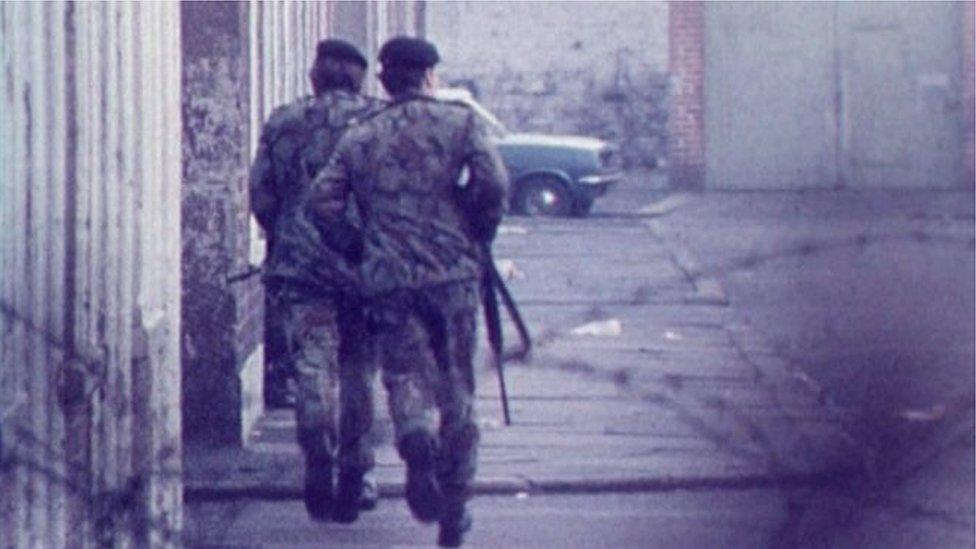
- Published21 February 2011